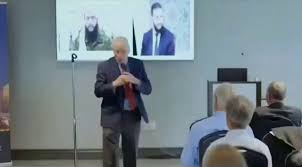The Syrian Presidency has dismissed claims made by former U.S. Ambassador to Syria, Robert Ford, regarding alleged private meetings with President Ahmad al-Sharaa in Idlib.
In an official statement, a source from the Presidency asserted that the interactions cited by Ford were not private encounters but rather part of large-scale public gatherings organized to highlight Idlib’s administrative and institutional development. These events, the source clarified, included hundreds of participants and did not feature any one-on-one meetings between Ford and President Sharaa.
The source further explained that Ford was present as a member of a delegation affiliated with a British research organization. His visit, according to the Presidency, carried no official diplomatic standing or special arrangement. The statement was first reported by Al Jazeera.
Ford’s Version: A Jihadist-Turned-Leader in Conversation
Robert Ford, who served as the U.S. Ambassador to Syria from 2011 to 2014, recently recounted two private conversations with Ahmad al-Sharaa during visits to Idlib in 2023—prior to the collapse of the Assad regime.
Speaking at the Baltimore Council on Foreign Affairs on May 5, during a lecture titled “The Rebels Won in Syria… Now What?”, Ford described being invited by a British conflict resolution group to meet Sharaa. Initially hesitant due to security concerns and “painful memories,” Ford said he ultimately agreed to attend after consulting others who had met with the Syrian leader.
He described the first encounter, which took place in March 2023, as unexpectedly civil. “I sat right next to him,” Ford recalled. “I said, in Arabic, ‘Never in a million years would I have imagined sitting beside you—long beard, military uniform…’ He looked at me, quietly, and replied, ‘Neither did I.’ Then we had a very civilized conversation.”
According to Ford, Sharaa acknowledged that the ideological principles he had followed during his time in Iraq no longer applied now that he was governing four million people in Syria’s northwest. “He told me he’s learning to make concessions,” Ford said, “because governing an opposition-controlled area requires a different approach.”
Ford claimed a second visit to Idlib took place in September 2023, during which he met with local Christian residents, including an individual who would later become the Bishop of Aleppo. The Bishop, he said, noted measurable improvements in governance and security, including a visible shift in Hay’at Tahrir al-Sham’s behavior—such as the return of confiscated properties and improved discipline.
According to Ford, residents reported the return of approximately 50 confiscated homes, with only one plot of land still in dispute. Sharaa allegedly explained that the land was held by another faction and expressed a preference for resolving the matter politically.
Ford also pointed to signs he viewed as indicative of Sharaa’s transformation. These included his public appearances with his wife—unusual in Salafi-jihadi circles—and his outreach to Syrian Jewish expatriates, including an invitation to visit Damascus and restore a long-abandoned synagogue.
In addition, Ford said that Sharaa expressed an intent to hold elections within three to four years, a position Ford characterized as a significant ideological break from his jihadist roots. “For someone shaped by the Salafi-jihadi movement, to advocate elections is, in that context, considered heresy,” Ford said, describing Sharaa’s stance as “remarkable.”
This article was translated and edited by The Syrian Observer. The Syrian Observer has not verified the content of this story. Responsibility for the information and views set out in this article lies entirely with the author.


